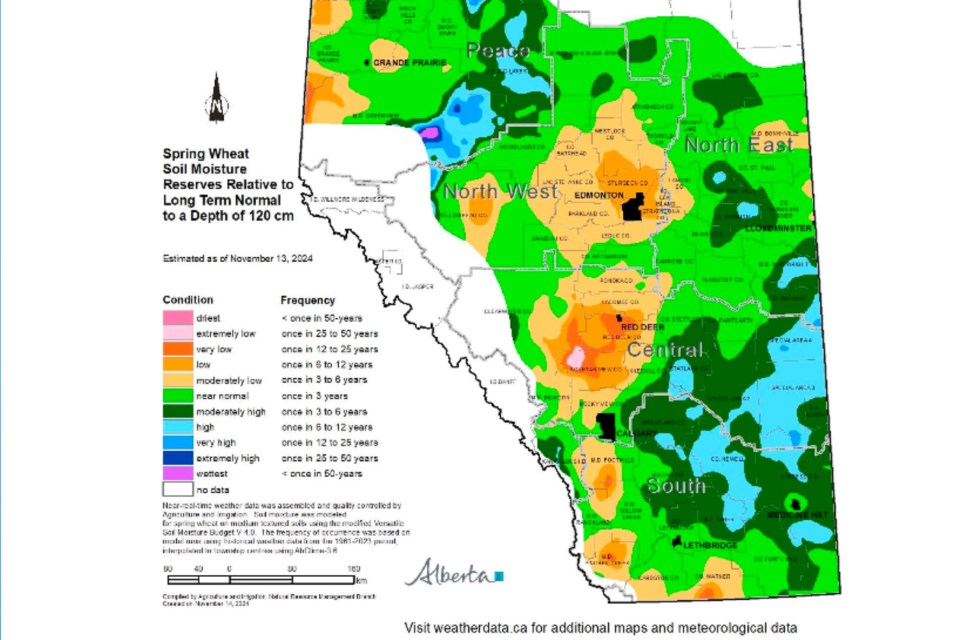MOUNTAIN VIEW COUNTY - Council has defeated a motion calling for the creation of a list of hydraulic fracturing, commonly referred to as fracking, sites in Mountain View County.
The move came during the recent regularly scheduled council meeting, held in person and online.
Fracking involves the injection of water and other fluids down a drilling well to increase production. Several oil and gas companies operating in the county use the fracking as part of the production processes.
The motion, put forward by Division 6 Coun. Peggy Johnson stated: “That council request administration create a list of the land locations of the fracking sites in Mountain View County up to Nov. 13, 2024, along with the division of the land location and if the list illustrates significant correlation with the identified dry area on the map that a letter outlining this observation be sent to the Minister of Environment and the Minister of Energy and the county’s agricultural service board (ASB).”
At the earlier Nov. 27 council meeting, Coun. Johnson made the following motion: “That the ‘Spring Wheat Soil Moisture Reserves Relative to Long Term Normal to a Depth of 120 cm Map’ be brought to a future council meeting, with the intent that council will send a letter to the minister.”
The map referred to in the motions was from the Alberta government’s Agriculture Moisture Situation update report dated Nov. 13, 2024.
“I think that the greatest value in having Mountain View County look at this is we could share it with our ag board because in general agriculture land has value when the land has water,” Johnson told council at the Dec. 11 council meeting.
“If this significant amount of land doesn’t have soil moisture, then I think that is going to affect its production capabilities for sure. If there is correlation between using alluvial aquifers and other ground water sources (for fracking), I think it would be important for ag service board to know about it.”
The agricultural service board is made up of county councillors and members of the public at large. It advises the county and province on agriculture-related issues and concerns.
Johnson says she has consulted with the Red Deer River Watershed Alliance on the matter.
“I got an email back from them that said they they are looking at doing some groundwater work probably not until 2026, so their reports based on groundwater in the watershed won’t be available until after 2026.
“By listing the fracking areas in a simple list indicating what division those fracking are at, which would take up a smaller amount I time, I think we could see if there is a co-relation between the dry areas and the fracking areas.
“And then not only would we share this with the minister, but also with our local ag service board. If there is a co-relation, I think it would be useful to all our ratepayers to know that.”
During the Dec. 11 council meeting, Reeve Angela Aalbers said, in part, “I’m struggling with this because if this is something we are going to send to the minister then just doing it on an isolated area is probably not provincial-wide.
“I’m sure there are areas where there is high levels of fracking where the soil moisture probably isn’t impacted and then does that draw the same conclusion? So I’m not sure that I would feel comfortable in going to the minister with information when I’m pretty sure that we are not going to be able to build a complete picture just based on this.”
Coun. Jennifer Lutz said, in part, “When you said watershed (RDWSA), to me it’s more their mandate to figure this out than using county resources to do it. So maybe it’s a project they would be interested in and that’s maybe just bigger than Mountain View County. I think somebody should be work in on this, but I just don’t think it’s what our staff should be focused on.”
Deputy reeve Dwayne Fulton said, in part, “I would suspect that the AER (Alberta Energy Regulator) would have all of this is information (on fracking operations in the county), exact location and durations, so I don’t believe this is in our area to gather the appropriate information from within county resources.”
Coun. Johnson voted in favour of the motion, with councillors Greg Harris, Tiffany Nixon, Alan Miller, Lutz, Fulton and Aalbers voting against.



